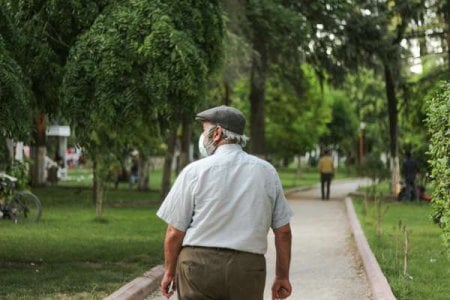Breathe Easier and Crush COVID: How Victoria's Revolutionary 'Clean Air' Project Can Skyrocket Your Productivity
By
Danielle F.
- Replies 3
In an era where the term 'unprecedented' has become a staple in our daily lexicon, Victoria is pioneering a revolutionary approach to public health and productivity with its new 'clean air' project. This initiative is not just a beacon of hope for ending the COVID-19 pandemic but also a potential catalyst for boosting productivity across the board.
The 'Pathway to Clean Indoor Air' project, a $9.9 million collaboration between the Burnet Institute, the Victorian Government, and other research partners, is set to transform how we think about and manage the air we breathe indoors. It's a timely response to the lessons learned from the COVID-19 pandemic, which has highlighted the critical importance of airborne transmission in spreading respiratory viruses.
For too long, the focus on hand hygiene and surface cleaning, while still important, overshadowed the reality that the virus is predominantly airborne. The image of a Woolworths shopper diligently applying hand sanitiser at the entrance of the store, while the air around them teems with microscopic aerosols, is a stark reminder of the misdirection in our early pandemic response. It's akin to mopping the floors while the ceiling leaks – a futile effort if the real problem isn't addressed.
The science is clear: SARS-CoV-2, the virus responsible for COVID-19, can linger in the air like smoke, invisible and insidious, waiting to be inhaled by its next host. This understanding has shifted the paradigm from surface sanitisation to air sanitisation. It's a shift that acknowledges our indoor lifestyles – with Australians spending around 90% of our time inside – and the need for air quality standards that protect our health and enhance our cognitive functions.
The implications of this project are vast. Imagine walking into a building with the same confidence you have when drinking tap water, knowing that the air you breathe is clean and safe. This is the vision that Professor Brendan Crabb, director and chief executive of the Burnet Institute, has for the future. It's a vision where clean air solutions could have prevented the pandemic or at least mitigated its impact significantly.
But the benefits of clean air extend beyond the realm of infectious diseases. Poor indoor air quality is a silent thief, robbing us of our health and cognitive abilities. It's linked to a disturbing array of health issues, including cancer, stroke, heart disease, and chronic conditions like asthma. It's also a thief of productivity, with research suggesting that improved ventilation could add a staggering 10% to a business's bottom line by reducing absenteeism and enhancing employee performance.
The 'Pathway to Clean Indoor Air' project is not just about identifying the tools for cleaner air – which include CO₂ monitors, air purifiers, and germicidal ultraviolet light – but about understanding how to implement these tools effectively in various settings. It's about finding the most cost-effective strategies to improve air quality in schools, offices, and healthcare facilities, and measuring the impact on health and productivity.
The project also aims to develop a policy framework for indoor air quality regulations and legislation, potentially changing building codes and establishing new standards for indoor environments. This is a game-changer, shifting the focus from treating illness to preventing it in the first place.
As we face the challenges of climate change, with extreme weather events forcing us indoors more frequently, the need for clean indoor air becomes even more pressing. The Victorian Government's leadership in this area sets a precedent for the rest of the country and the world.

In conclusion, the 'Pathway to Clean Indoor Air' project is a trailblazing initiative that promises to make clean indoor air the norm. It's an investment in our health, our productivity, and our future. As we continue to navigate the tail end of the pandemic and look towards a post-COVID world, projects like this offer a breath of fresh air – quite literally – and the potential for a healthier, more productive society.
The 'Pathway to Clean Indoor Air' project, a $9.9 million collaboration between the Burnet Institute, the Victorian Government, and other research partners, is set to transform how we think about and manage the air we breathe indoors. It's a timely response to the lessons learned from the COVID-19 pandemic, which has highlighted the critical importance of airborne transmission in spreading respiratory viruses.
For too long, the focus on hand hygiene and surface cleaning, while still important, overshadowed the reality that the virus is predominantly airborne. The image of a Woolworths shopper diligently applying hand sanitiser at the entrance of the store, while the air around them teems with microscopic aerosols, is a stark reminder of the misdirection in our early pandemic response. It's akin to mopping the floors while the ceiling leaks – a futile effort if the real problem isn't addressed.
The science is clear: SARS-CoV-2, the virus responsible for COVID-19, can linger in the air like smoke, invisible and insidious, waiting to be inhaled by its next host. This understanding has shifted the paradigm from surface sanitisation to air sanitisation. It's a shift that acknowledges our indoor lifestyles – with Australians spending around 90% of our time inside – and the need for air quality standards that protect our health and enhance our cognitive functions.
The implications of this project are vast. Imagine walking into a building with the same confidence you have when drinking tap water, knowing that the air you breathe is clean and safe. This is the vision that Professor Brendan Crabb, director and chief executive of the Burnet Institute, has for the future. It's a vision where clean air solutions could have prevented the pandemic or at least mitigated its impact significantly.
But the benefits of clean air extend beyond the realm of infectious diseases. Poor indoor air quality is a silent thief, robbing us of our health and cognitive abilities. It's linked to a disturbing array of health issues, including cancer, stroke, heart disease, and chronic conditions like asthma. It's also a thief of productivity, with research suggesting that improved ventilation could add a staggering 10% to a business's bottom line by reducing absenteeism and enhancing employee performance.
The 'Pathway to Clean Indoor Air' project is not just about identifying the tools for cleaner air – which include CO₂ monitors, air purifiers, and germicidal ultraviolet light – but about understanding how to implement these tools effectively in various settings. It's about finding the most cost-effective strategies to improve air quality in schools, offices, and healthcare facilities, and measuring the impact on health and productivity.
The project also aims to develop a policy framework for indoor air quality regulations and legislation, potentially changing building codes and establishing new standards for indoor environments. This is a game-changer, shifting the focus from treating illness to preventing it in the first place.
As we face the challenges of climate change, with extreme weather events forcing us indoors more frequently, the need for clean indoor air becomes even more pressing. The Victorian Government's leadership in this area sets a precedent for the rest of the country and the world.
Key Takeaways
- Victoria has initiated an ambitious project to improve indoor air quality, with the aim of reducing the spread of respiratory viruses like COVID and enhancing public health and productivity.
- The $9.9 million Pathway to Clean Indoor Air project is a collaboration between the Burnet Institute, the Victorian Government, and other research partners, and seeks to develop strategies for cleaner air and to establish indoor air quality standards.
- The project not only aims to mitigate the risks of infectious diseases but also addresses broader health issues related to poor air quality, such as its impact on cognitive function and chronic diseases.
- Experts argue for mandatory indoor air quality standards in public spaces and suggest that better air quality could have significant health and economic benefits, potentially preventing future pandemics and reducing the burden of disease linked to indoor air pollution.









